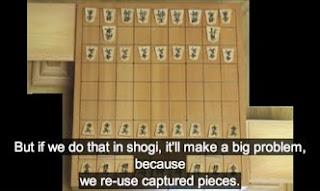
"He entered the realm of ideology and philosophy", admirers say.
In 2010, Habu Yoshiharu has won the Meijin title seven times and currently holds the Oza and Kisei shogi titles. Habu is a FIDE Master in international chess, with a rating of approximately 2400.
For Habu "Everything is governed by the law of cause and effect."
People like to discover the secret ways Asian societies pursue their existence. The information revolution and globalization changed our society into a more complex world, a revolution of how we work and live. To be successful as a professional you have to spend more time enhancing your professional skills and strategies than you used to do 1 or 2 decades ago. For the westerners curious about Asia, it is custom to often talk about Asia as a rival, as a master of strategy be in China, Japan, India, and often quoted is "The Art of War" attributed to a Chinese strategist Sun Tzu. But when carrying on with discussion on tactics and strategies, there are other intellectual games coming to mind such as "Go" or especially "Shogi."
In Japan, Shogi is a culture, deeply rooted in Japanese society. It has fascinated and excited many people. The game has been relatively slow to spread to countries where Chinese characters are not in common use.
Yoshiharu Habu won the 68th seventh game this year for the 7th time. He is the greatest visionary in the Japanese chess world. His passion's name: Shogi, in Japanese " 将棋 "
It is a two-player board game in the same family as Western chess. It is the most popular of a family of chess variants native to Japan. Shogi means general's [shō 将] boardgame [gi 棋]. It is the same [shō 将] used in "Shōgun".
I met Habu Yoshiharu in town recently, and not only he is a fascinating and kind character, he also is a major strategist, and as usual in these VIP circles, he is modest and genuine.

VDO of the 68th Meijin Title Match, Game Four (Habu vs Miura)
Learning about Shogi
1) On Japanese Shogi's strategy, an interesting interview, an English-translated version of "Yoshiharu Habu and Modern Shogi," written by Michio Umeda. Quotes:
"When one asks Habu about the essence of modern shogi, he always says that there has been "no freedom on the board." When I first heard this from him, I did not grasp what he meant. For as long as we play within the rules, we are allowed to play any moves on the board. "Freedom on the chess board" should naturally be the premise of shogi. However, what Habu was considering as problematic was that "Freedom on the chess board" had been prevented by traditions to respect the seniority system and tacit agreements, which were not only prevalent in the Shogi (Japanese chess) world but also common in the Japanese village society. "As a promising Shogi player, you need to be an orthodox Ibisha (Static Rook) player at least at a younger age. Every successive Meijin was so. On a special stage like the Meijin title match, you need to play the Yagura Opening, which is the pure literature of shogi. And, "How dare you choose Furibisha (Ranging Rook) against a great senior." are some examples of things about seniority system. For Habu this is one of the reasons why "the number of strategies are limited throughout the Shogi world."
2) Interview of Habu Yoshiharu (quotes of Japan Times, 2007)
Q: What do you think about chess, backgammon and go?
A: I have played all three. Due to the use of dice, backgammon is a very emotional game, while go is all about occupying as much space as possible and so it is more visually related. Chess is an aggressive game that has no excess to it.
Q: Do you think Japanese culture has anything to offer the world in the 21st century?
A: Yes, it has a different way of looking at things, which I think is appealing to other countries. However, Japanese people are not very good at marketing their culture.
Q: Individualism is rising in Japan, but many people still can't make decisions or take responsibility. What do you think?
A: I think the only way for individualism to work in a healthy way is for decisions and responsibility to be a part of a unified system.
Q: What are your goals in life?
A: To keep making new discoveries. I get the feeling there is no end to this process.

Sources:
-Japan Times
-Reporter's notes
No comments:
Post a Comment
Be nice and informative when you post or comment.
Thank you to visit Asian Gazette Blog of Joel Legendre-Koizumi.